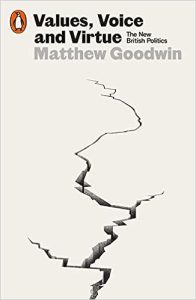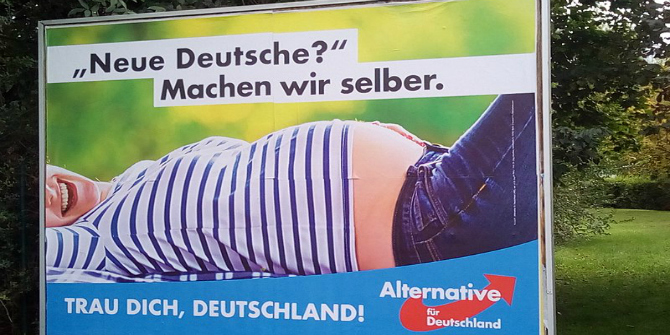In Values, Voice and Virtue: The New British Politics, Matthew Goodwin claims that recent upheavals in British society (like Brexit) have emerged in response to the rise of a liberalised, globalised ruling class, or “new elite.” Goodwin’s emphasis on “culture wars” over empirical evidence fails to convince Vladimir Bortun.
Values, Voice and Virtue: The New British Politics. Matthew Goodwin. Penguin. 2023
 If you believed academics are no longer relevant beyond their own professional bubble, Matthew Goodwin’s latest book has come to challenge that perception. Although it has been passionately praised and criticised across mainstream and social media, one shortcoming of most reactions has been to treat the book as a scholarly work.
If you believed academics are no longer relevant beyond their own professional bubble, Matthew Goodwin’s latest book has come to challenge that perception. Although it has been passionately praised and criticised across mainstream and social media, one shortcoming of most reactions has been to treat the book as a scholarly work.
The crux of his argument is that a “new elite” has emerged in Britain over the past few decades. It consists of middle-class graduates living in big cities, working in “professional” jobs and displaying a “radically progressive” outlook on cultural issues such as immigration, sexual minorities or British identity. This new elite, according to Goodwin, has captured the country’s key economic, political and cultural institutions. It uses this power to impose its “woke” values on the rest of society. However, a cross-class alliance of people who do not feel represented by this elite and its worldview have started to strike back, first by voting for Brexit and then for Boris Johnson. This cleavage around cultural rather than economic issues is, according to Goodwin, what drives “the new British politics”.
[A] cleavage around cultural rather than economic issues is, according to Goodwin, what drives “the new British politics”.
There are several premises in Goodwin’s argumentation that, albeit not original, one would struggle to disagree with. For one, he is right to point out the erosion of significant differences between the two main political parties, Conservative and Labour, which have coalesced around the liberal consensus set up by Margaret Thatcher in the 1980s. He is also correct in linking that to the relative reduction in social mobility (from accountancy to architecture to acting), coupled with the rise of a new middle class that has benefitted from that liberal consensus and that has been increasingly detached from other social groups. Indeed, a significant part of this social group displays a broad liberal orientation on both economic and cultural matters. However, Goodwin uses these widely accepted observations to perform a series of logical and empirical leaps in the attempt to push a very transparent political agenda.
The book fails to demonstrate that the people occupying the most influential positions in British economic and political spheres share a “radically progressive” outlook
First and foremost, despite the theoretical and empirical advances in sociology of elites, the book fails to provide a straightforward definition or classification of elites. This is reflected in the vagueness of the “new elite”, said to be composed of the graduates in professional jobs who hold left-wing values on cultural issues. This amounts, according to Goodwin, to around 15% of the population, which renders the very notion of elite rather meaningless. Moreover, graduates may well be at opposite ends of the socioeconomic scale, as young graduates are facing the toughest job market in recent times. This group is also eclectic in terms of ideological outlook. As Goodwin indicates, even in London (supposedly the epicentre of the new elite), less than half of graduates are “liberals” (30). Ultimately, the book fails to demonstrate that the people occupying the most influential positions in British economic and political spheres share a “radically progressive” outlook that glues them together. Indeed, the reader is left wondering why the blend of economic and social liberalism would classify one as “radically progressive” rather than simply liberal.
But what makes the new elite display these values? Goodwin correctly identifies the role of higher education in making people more liberal (both culturally and economically), but he does not consider whether elites might adopt some progressive views in the face of popular demands, to maintain their legitimacy and the status quo that benefits them. As Jackman and Muha showed in their pioneering 1984 study, although well-educated whites held more favourable attitudes towards black people than less-educated whites, they did not support any concrete government economic intervention in promoting racial equality. As they put it, “in the face of subordinate challenge, dominant groups also become practiced in the art of making symbolic concessions in lieu of tangible concessions.” Thus, Goodwin seems to deny ordinary people any agency in pushing more progressive values into the mainstream.
Shouldn’t social scientists welcome this kind of critical interrogation and debate? Isn’t history a science to be rewritten in the light of new evidence and arguments?
By contrast, the “traditional values” displayed by conservatives are presented as almost natural, despite the vast literature showing how notions such as “national identity” or “whiteness” may be constructed in a top-down way that benefits the elite. Goodwin’s argumentation bears another contradiction: if the new elite imposes its progressive values on the rest of society, was that not the case also with the old elite and its traditionalist values? Indeed, Goodwin fails to explain what exactly is wrong with questioning received knowledge about the past, the Empire, British identity etc. Shouldn’t social scientists welcome this kind of critical interrogation and debate? Isn’t history a science to be rewritten in the light of new evidence and arguments?
Goodwin’s dichotomy seems to stand empirical scrutiny, but in the reverse: a conservative ruling elite governing an increasingly progressive country.
Goodwin plays the numbers game throughout the book, as though values are more or less worthy depending on the number of people holding them. But even the data that Goodwin himself puts forward does not really back up his dichotomy between the “cosmopolitan” elite and the “traditionalist” people. While “only 41 per cent of all voters in the country … think Britain cannot move on unless it deals with past mistakes” (90), this is still a very significant part of the population rather than a tiny elite. On Brexit, we are told that almost half of the working class wanted to leave the EU (72); but that means that almost half did not want to leave. Indeed, the latest report of the British Social Attitudes survey, cited throughout the book, actually shows more people displaying progressive views on several cultural issues, such as immigration. As the authors of the report conclude, “the ‘anti-woke’ position on our indicators has for the most part become less popular over time.” More recent surveys show that over half of the British public believe refugees should be allowed to stay in Britain. This view has been on the rise during the anti-refugee rhetoric and policies of the current government. Goodwin’s dichotomy seems to stand empirical scrutiny, but in the reverse: a conservative ruling elite governing an increasingly progressive country.
Who benefits from deflecting away from material issues during the biggest living cost crisis in a generation?
At the same time, Goodwin sidelines the most pressing issues that face ordinary people today, according to the people themselves. The latest release from the Opinions and Lifestyle Survey shows the five biggest issues are the cost of living (92%), the NHS (85%), the economy (78%), climate change and the environment (62%) and housing (55%). They are all very material issues and have little to do with the “culture war” that is Goodwin’s primary concern. They have more to do with the neoliberal, right-wing policymaking that has shaped British society over the past few decades. Goodwin pays lip service to this (see 100), only to reemphasise culture as the key cleavage in British politics today. Why? Who benefits from deflecting away from material issues during the biggest living cost crisis in a generation?
Goodwin inadvertently answers that in his nostalgic portrayal of the “old elite”, characterised by “a strong sense of loyalty and obligation to people who came from different backgrounds, regions and classes”, an elite that “often shared the instinctive conservatism of most of the voters” (98). Given Goodwin’s own links to today’s right-wing elites, perhaps his book can be best seen through the lens of a conflict at the top of society: between a liberal elite (“new elite”) and a conservative elite (“old elite”). But beyond these ideological labels, as recent research has suggested, this intra-elite rivalry is fundamentally rooted in competing economic interests and agendas. It’s the economy, Professor Goodwin.
Note: This review gives the views of the author, and not the position of the LSE Review of Books blog, or of the London School of Economics and Political Science. The LSE RB blog may receive a small commission if you choose to make a purchase through the above Amazon affiliate link. This is entirely independent of the coverage of the book on LSE Review of Books.
Main Image: Alice-photo on Shutterstock.







